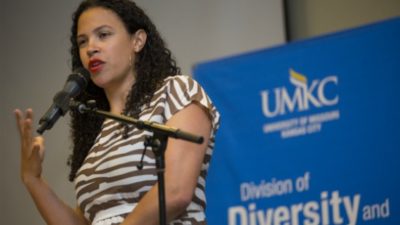Knowledge, Expertise and Experience
Women from Africa, Asia, Europe, South America and nearby states in North America attended the 2015 Women of Color Leadership Conference.
MC Mia Ramsey strolled across the stage in her black sweater, black skirt, white T and pink sneakers. An energetic lady, Ramsey was ready to inspire and encourage women through song, jokes, personal stories and rousing introductions of presenters.
The 10th annual conference, “Together We Rise: 10 Years of Paving the Way,” at the University of Missouri-Kansas City focused on improving the lives of all women of color. More women of diverse backgrounds attend each year to share their expertise and to learn from facilitators and speakers.
Shortly after keynote speaker Lacey Schwartz took to the podium, she made an emphatic statement: “Tell the truth about things that are hard to tell the truth about.” If that had been the case, her life would have been less complicated, and she would have known far sooner exactly who she was.
In the documentary “Little White Lie,” Schwartz tells her story of growing up in New York with her parents and a strong sense of her Jewish identity, only to discover she was not white, but biracial. She created the documentary to start a conversation about difficult conversations.
“My parents married in 1968, and my mom began her affair with my biological dad, Rodney, that same year. I was born in ’77,” said Schwartz. My ‘real dad’ described it as “the ultimate betrayal.”
Schwartz said that her world was defined by the world her parents created for her, and they never talked about it.
“If you looked too closely at it, it didn’t make any sense. So, we just didn’t look,” said Schwartz. “My life didn’t seem like a coincidence to me. And, my clearly Jewish name – Schwartz – means black.”
Schwartz spent her teenage years trying to change her appearance, like straightening her hair. Her parents divorced when she was 16, and her boyfriend at the time challenged her beliefs about who she was. Like her parents, she wouldn’t talk about it.
Once accepted at Georgetown University, she was invited to attend the Black Student Alliance based on her picture that accompanied her application.
“Just like that, I was welcomed into the group, and I was ready to take on a new identity,” said Schwartz. “This was like a crash course for a black person titled ‘What It Means to Be Black.’
When she went home for the summer, Schwartz said she had to talk about why the way she looked. Her mom didn’t want to talk about it, but finally told her daughter about the affair. Her dad said he was proud of her but wouldn’t talk about it.
“I had to accept him for what he does and doesn’t want to talk about,” said Schwartz.
Her mom said that some people judged her, others sympathized. She and her mom have a stronger relationship since they went through the filming of their story. And for her mom it has given her a freedom that she previously didn’t have.
In addition to the keynote address, workshops throughout the day included “Women of Color Living in Whiteness: Examining How Internalized Racist Oppression Triggers Interpersonal and Collective Conflict;” “LGBTQIA;” “Take Control of Your Health;” “Feminism: The Other “F” Word;” and “Bi/Multi-Racial Identity.”
The facilitator of “Women of Color Living in Whiteness,” PaKou Her, has studied what she terms ‘institutionalized racist oppression’ for more than 18 years and its impact on people of color.
“It’s not just individual prejudice, bigotry or racism, it’s more systemic than that,” said Her, an Asian America. “The problem is when it is combined with the power of systems and institutions.” She helps individuals find ways to work in communities where people of color have influence; to work on a global level; and work to change the hearts and minds of people on an individual-by-individual level.
The ever-evolving conference is a learning experience and it took on “Feminism: The Other “F” Word,” sharing ideas to uplift all women, including holding the media accountable for biased news coverage; fostering sisterhood; and supporting universal healthcare for all people.
Several women attended the “Bi/Multi-Racial Identify” workshop to gain tips to better understand how to support and communicate with bi-racial family and friends.
“I have bi-racial grandchildren,” said one African American baby boomer. “I know some of the challenges they are going to face, and I want to find mechanisms, more modern ways to help them whenever and wherever possible.”
“To piggyback off what she said, I need to find ways to communicate appropriately or perhaps effectively and support my bi-racial grandchildren,” said a Caucasian attendee, also a baby boomer.
Schwartz summed up many of the thoughts expressed by numerous women at the conference.
“Differences scare people, and I feel my lessons and the documentary will help people understand and perhaps be more accepting of differences,” Schwartz said. “Perhaps they can find ways to celebrate what we have in common.”
Schwartz said we should look for her next documentary – “How It Feels to be Free.” In line with her upcoming work, she stressed the value in undertaking this initial, liberating project.
“It was hard for my parents when I defined myself as bi-racial and a black woman. That’s how I’m seen, how I am most comfortable identifying myself,” said Schwartz. “Identity is singular. Being black feels good for me.”
|Wandra Brooks Green, Division of Strategic Marketing and Communications

